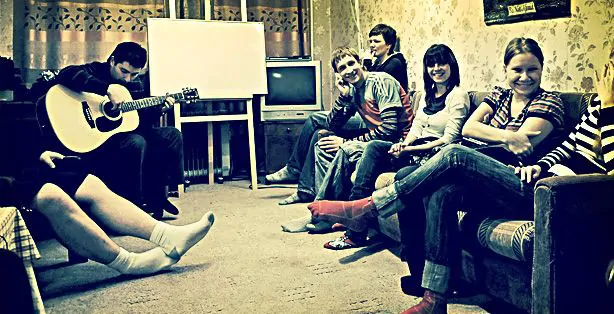My stomach is empty, as is my fridge. It is very much time to make a trip to the grocery store. I grab my wife, wallet and keys, and fly out the front door.
Minutes later, ravenous, I am scouring the aisles of the grocery store, piling sustenance into my cart. I have breads, cereals, meats, cheeses, puddings, pastas, frozen burritos, and produce. Kozy Shack, Life, Prego, Tillamook. Never grocery shop when you are hungry. Your savings will disappear at the checkout.
With a full cart (and then some) my wife and I exit the store. I am almost sprinting, ready to tear open a bag of Kettle Chips for the car ride home.
We get to the car and unload our groceries, caught up in the excitement of our forthcoming gluttonous feast. Then, we hop in and speed out of the parking lot. As we approach the first stoplight, we look to our left and notice a woman sitting on the median.
She is perched on an overturned shopping cart. She is dressed in tattered, mismatched clothing. Next to her is another cart filled with empty soda cans and plastic water bottles. Amidst the recyclables are several bags of belongings—socks, shirts and small household items. Her face is sullen and vacant. She does not speak, but only looks up at us through weathered, distant eyes. The woman holds a sign:
Homeless.
Need Help.
God Bless.
The first wave of thought that comes over me is guilt: Here I am raiding Vons like a sultan and not thinking twice about it, yet this person doesn’t even have a roof over their head.
Then another thought enters my mind: What if this person is running a scam? What if she is just lazy or is an addict or has made decisions to put herself in this position? Without a doubt, there are those out there who would take advantage of a situation like this, using homelessness as a means to rip people off …
On the one hand, we know we are called to help the homeless, to give to those who are in need. Jesus was pretty clear on this. Nothing we have is our own. And everything we have been given is simply a tool to bless others, right?
But, how do we know what a homeless person is going to do with what we give them? After all, people become homeless for many different reasons. We all know the stories about the drug addicts, the drunks and the criminals. But there are also those who, through no fault of their own, have run into economic problems—and the sad reality is that there are so many more people in this situation because of our economy. We know that some are homeless because they have chosen to be, because they refuse to get a job, or because they refuse to get help for their addictions. But there are also those who are the victims of mental illness, who cannot possibly change their position in life without outside help. There are scammers—people who don’t work because they are able to raise generous amounts of cash running street hustles. But there are also many hard-working people out there who have been laid off and who are trying with all their might to find work for themselves …
I look at my wife, and I know that she is going through a similar debate inside of her. Is this a calculated attempt to capitalize on our guilt or a sincerely hurting person who desperately needs our assistance?
The light is about to turn green, and we have to make a quick decision.
We decide to keep our window rolled up and just head home.
During our ride, we deliberate over the situation, and it is a depth-filled conversation that lasts the rest of the evening.
I feel a vague sense of remorse for not giving anything to the woman. But then again, I recall times where I have been in similar situations, gave the person money, then second-guessed myself afterward.
What is the right thing to do?
These are legitimate questions, because in these times our hard-earned income does not last as long or go as far as it used to. The last thing we want to be doing is giving our money away to someone who is just going to buy alcohol or drugs or find a way to avoid finding work. Yet, we want to do what is right at the same time.
Look, I know that in many cases, giving food is a better alternative than giving money. But what if you are running late for an appointment, or you are at a stoplight?
Truth be told, many of us have a preconceived opinion of homeless people. We fear them, just as we distrust their motives. And we use this as an excuse—a justification—as to why we don’t do more for those in need around us.
But here is the burning question—does God want us to give without judging the ones we are giving to? If you are stopped at a light and someone passes you with a sign asking for change, is it better to give it to them, knowing they may use it for wrong, or is it better to just look the other way?
I took this situation as an opportunity to look in the mirror. Am I doing anything at all in my life to help those in need around me, in my immediate communities? If the answer is no, do I have an excuse?
It’s the holiday season, so naturally it is a time for thanks, a time for reminding ourselves how blessed we are. And it is also a time to give to others who are in need. But this year, why not take it one step further, and examine our motives as well as our understanding of the heart of Jesus? Why not take these questions as an opportunity to look, once again, at the stories we have in our Holy Book about’ Jesus’ interaction with the needy?
Andrew Schwab is a writer and musician. His website is www.andrewschwab.com, where you can read more from him and check out his new book Fame Is Infamy.






















